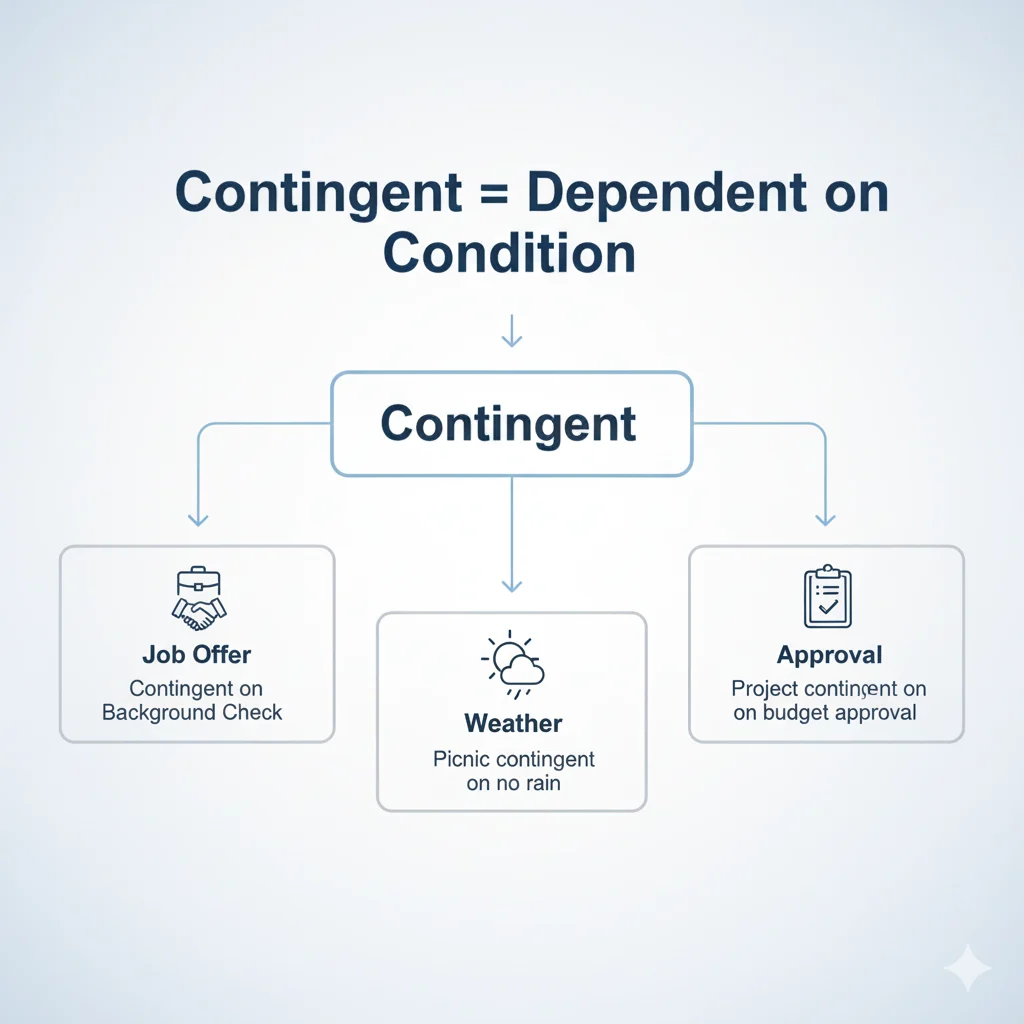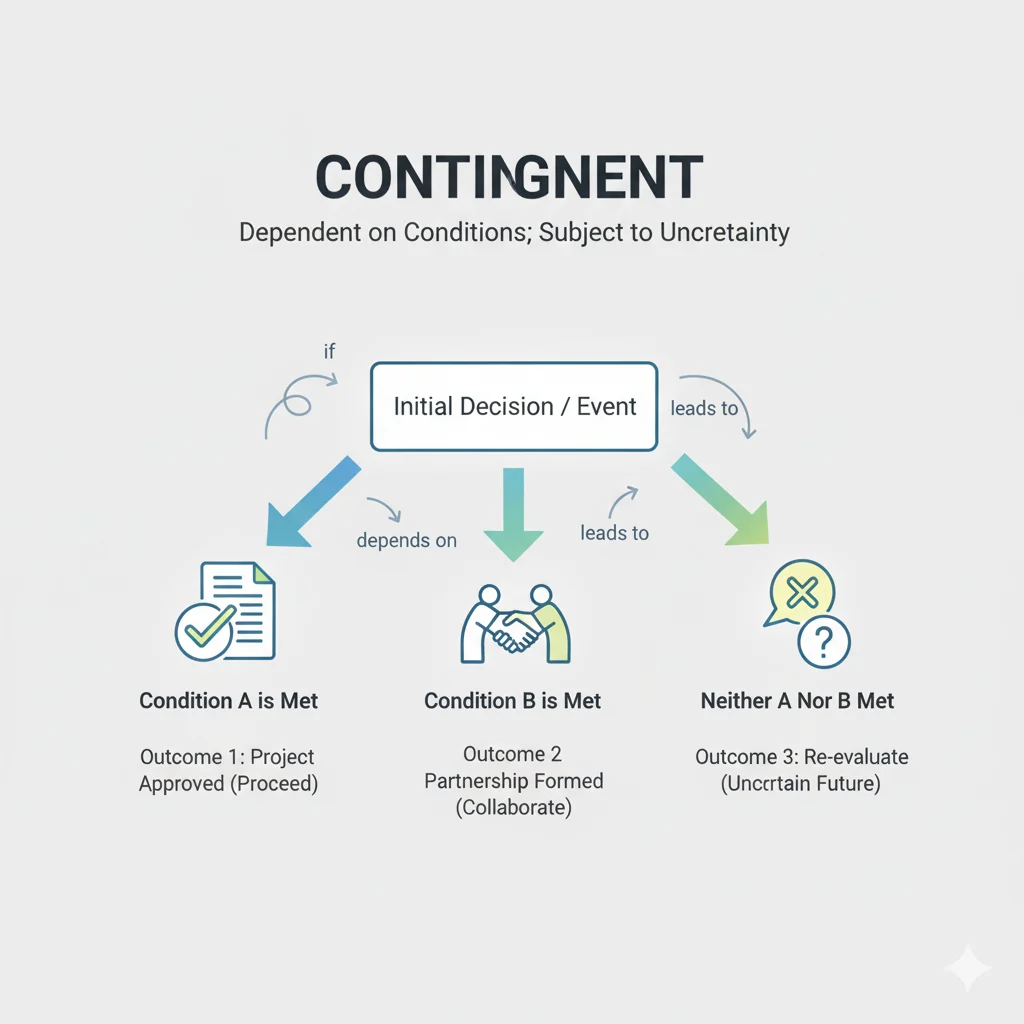👉 “Contingent” means “dependent on certain conditions or circumstances.”
It’s often used to describe something that will only happen if another event occurs.
Example:
“The job offer is contingent on your background check.”
This means — you’ll get the job only if your background check clears.
Why Everyone Should Know What “Contingent” Means
Whether you’re buying a house, waiting for a job offer, or reading a business contract — you’ve probably come across the word “contingent.”
It sounds formal, but it’s actually simple: something that depends on something else.
In the modern world — from real estate listings to legal documents, project plans, or even team decisions — the word “contingent” appears everywhere.
Understanding it helps you read contracts better, make smarter deals, and avoid confusion in professional or personal communication.
Let’s break it down with clear examples, contexts, and meanings.

💡 Definition & Meaning of “Contingent”
According to the dictionary, contingent means:
“Subject to change or dependent on certain conditions.”
💬 In Simple Terms:
Something that might happen — but only if another thing happens first.
Examples:
- “Your promotion is contingent on your performance this quarter.”
- “The event is contingent upon the weather.”
- “Their success is contingent on teamwork.”
In short, “contingent” = conditional, not guaranteed.

🕰️ Origin & Background
The word “contingent” comes from the Latin word “contingere”, meaning “to touch, to happen, or to depend on.”
It’s been used in English since the 14th century, mainly in legal and philosophical writing. Over time, its use expanded into:
- Business and finance (e.g., contingent liabilities)
- Real estate (e.g., contingent offers)
- Human resources (e.g., contingent workers or staff)
- Everyday conversations (“That plan is contingent on your approval.”)
Today, it’s a word that blends professional logic with real-world practicality.

📚 Usage in Different Contexts
The meaning of “contingent” changes slightly depending on where it’s used.
Let’s explore the main areas 👇
🏡 1. In Real Estate
When a home listing says “contingent,” it means the seller has accepted an offer, but the sale isn’t final yet.
✅ Common real estate contingencies:
- Financing Contingency: Sale depends on buyer getting a loan.
- Inspection Contingency: Sale depends on passing inspection.
- Appraisal Contingency: Sale depends on home’s appraised value.
Example:
“The house is contingent — we’re waiting on the inspection results.”

💼 2. In Business or Work
Used when something depends on external outcomes.
Example:
“The project’s success is contingent on receiving funding.”
“Your hiring is contingent upon background verification.”
✅ Other business uses:
- Contingent plan: A backup plan for unexpected issues.
- Contingent offer: Conditional job or business offer.
🧾 3. In Legal or Financial Terms
“Contingent” is a key word in contracts and accounting.
- Contingent Liability: A potential debt that may occur in the future (e.g., lawsuits, warranties).
- Contingent Contract: Becomes valid only if a certain condition is met.
Example:
“The company recorded a contingent liability for possible legal claims.”
🧑🤝🧑 4. In Everyday Conversation
You’ll also hear it casually in phrases like:
“Our trip is contingent on everyone being free next weekend.”
or
“Dinner plans are contingent on whether I finish work early.”
It’s a formal word, but people use it naturally to sound thoughtful or precise.
❌ Common Misconceptions About “Contingent”
| Misconception | Reality |
|---|---|
| “Contingent” means guaranteed. | ❌ No, it means conditional. |
| It’s only used in law. | ❌ It’s used in business, HR, real estate, and daily life. |
| “Contingent” and “Pending” are the same. | ⚠️ Close, but not identical (explained below). |
⚖️ Comparison: Contingent vs. Pending vs. Conditional
| Term | Meaning | When Used | Example |
|---|---|---|---|
| Contingent | Dependent on certain conditions. | Real estate, contracts, business. | “Offer contingent on inspection.” |
| Pending | Waiting for a result or approval. | Emails, transactions, applications. | “Payment is pending.” |
| Conditional | Based on a specific rule or requirement. | Legal, academic, business. | “Conditional approval granted.” |
✅ Tip: “Contingent” sits between pending (waiting) and conditional (rule-based).
🧠 Similar Terms & Synonyms
| Synonym | Meaning | Example |
|---|---|---|
| Dependent | Relying on something | “Our decision is dependent on results.” |
| Conditional | Based on conditions | “Approval is conditional on review.” |
| Provisional | Temporary or subject to change | “Provisional plan pending budget.” |
| Uncertain | Not guaranteed | “Outcome is uncertain.” |
💬 How to Use “Contingent” in Sentences
Here’s how it naturally fits into everyday and professional use 👇
✉️ Text Example:
“My attendance is contingent on how my schedule looks tomorrow 😅.”
💼 Professional Example:
“The partnership is contingent upon both parties signing the agreement.”
🏠 Real Estate Example:
“The buyer made a contingent offer with a loan approval clause.”
✅ Grammar Tip:
Always use “contingent on” or “contingent upon,” never “contingent to.”
🌍 Regional or Industry Differences
- US & UK Business: Used heavily in contracts and real estate.
- Academic Writing: Used to describe theories that depend on assumptions.
- Casual Speech (Gen Z / Millennials): Rare but appears in texts meaning “depends.”
Example:
“It’s contingent on vibes” — a humorous Gen Z twist meaning “depends on the mood.” 😄
🧩 Quick Misuse Warning
Avoid using “contingent” when something is certain or already decided.
❌ “We’re going to dinner contingent on nothing.”
✅ “We’re going if everyone finishes work on time.”
🙋 FAQs
Q1. What does contingent mean in real estate?
A: It means the home sale depends on specific conditions, like financing or inspection.
Q2. Is contingent the same as pending?
A: No — contingent means conditional, pending means awaiting final action.
Q3. What is a contingent offer?
A: An offer that becomes valid only when certain terms are met.
Q4. What’s a contingent worker?
A: Temporary or contract-based employees whose work depends on company needs.
Q5. Can “contingent” be used casually?
A: Yes! It simply means “depends on something,” even in everyday talk.
🔚 Conclusion: Why Understanding “Contingent” Matters
The word “contingent” might sound technical, but it’s part of everyday logic — things depending on conditions.
From home sales to job offers, business plans, or group projects, being “contingent” means “it’s not final — yet.”
So next time you hear it, you’ll instantly know:
✅ It’s conditional,
✅ It’s dependent,
✅ And it’s not a sure thing — unless something else happens first.




